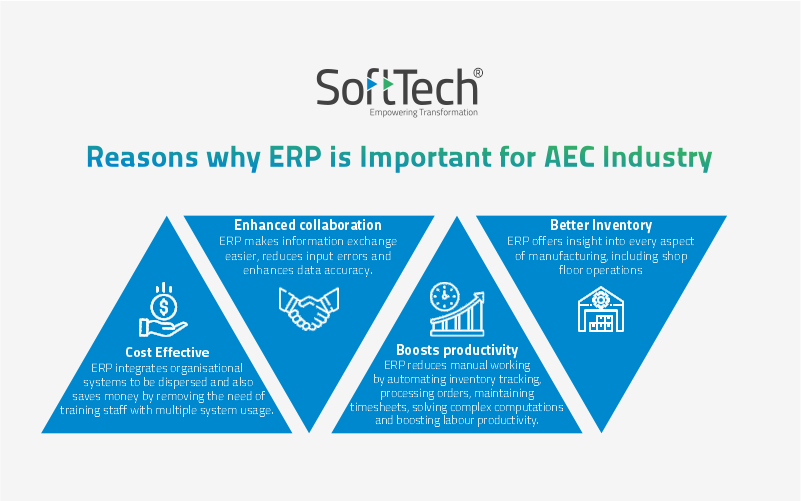Last Updated on November 23, 2023 by softtech
Enterprise resource planning is used by organisations that desire to control their business operations through a centralised, integrated system (ERP). ERP is frequently used by businesses in the supply chain to monitor all the moving parts of manufacturing and delivery. However, ERP can be used in a wide range of industries, including those in healthcare, nonprofits, construction, and hospitality. ERP is useful for businesses that must manage their staff, customers, and inventories.
ERP maintains all entered data in a single database, enabling all departments to operate with the same information. It is also possible to organise, evaluate, and create reports from all of this data. ERP combines the management of customers, employees, finances, business information, inventories, and the supply chain into a unified system.
Why ERP is needed for the construction domain?
Although ERP may share some objectives with other systems, its specific qualities set it apart as a player in the software market. The following eight factors should convince any firm of the value of enterprise resource planning (ERP) systems:

Cost Effective
Even though a number of suppliers recently changed their pricing practises, ERP programmes nevertheless demand a sizable financial investment. Numerous people may be of the opinion that the application won’t genuinely save your business any money because of its hefty costs. However, once you get over the sticker shock, it becomes clearer how ERP may produce a strong return on investment.
First, ERP unifies a variety of your company’s systems that might be currently scattered. From product development to accounts payment, your staff will have access to all the tools they need through a single central system for their roles.
Integrating systems will enable your staff to work more effectively with their time. When adopting ERP, users may find the information they need without having to hunt through numerous systems. Accessing information is made much easier by the central database. ERP also saves your company money by obviating the need for users to take various systems-specific training courses. As a result, training costs are reduced and the logistics require less effort. Instead of scheduling numerous training sessions with numerous different vendors, you only need to contact one.
Enhanced Collaboration
The benefits of ERP programmes may vary slightly depending on the software you’re using, but overall, all systems improve collaboration in some way. As was already mentioned, an ERP’s unique features are greatly influenced by its primary database. With this database, you give your company a single point of truth from which to operate. Costs are further reduced by minimising errors brought on by the usage of incorrect data.
Furthermore, a central database reduces any hesitation or delays during projects because all team members have access to the corporate data they need. Additionally, there is no requirement to aggregate data from various systems or sources. The fact that all data files are compiled, stored, shared, and accessed through a single system makes it irrelevant how precise, thorough, or safe the data files are. ERP aids in lowering data entry errors in various systems. ERP solves problems with data storage.
Boosts Productivity
The employment of conventional methods makes avoiding boring activities impossible. It used to take hours for employees to do duties like processing orders, managing timesheets, preparing reports, and monitoring inventory levels. These procedures not only take time, but they also lower staff morale and put you at risk for mistakes made by people. After entering the same line of information into several forms for the countless times, even the greatest staff members are susceptible to making mistakes.
With the right technology, the most monotonous tasks can be automated, thanks to an ERP. The database in ERP software allows the system to efficiently complete complicated computations and eliminates superfluous labour, such as data entry. Your team members will have more time available as a result, which will boost the labour return on investment. ERP increases your company’s production, effectiveness, and profitability as a result.
Better Inventory Management
ERP oversees inventory management as well as manufacturing. ERP provides information on all facets of manufacturing, including shop floor activities. This enables customers to maximise capacity through the optimization of production schedules, equipment, and labour.
ERP also handles the management of fixed assets and the Bill of Materials (BOM). With this software, users can easily create and modify BOMs and keep track of all previous modifications. Through the use of fixed asset management, users may schedule equipment maintenance to reduce unanticipated downtime, increasing their profitability and supply chain links.
The value of ERP far outweighs the initial cost, time, and effort needed for deployment if you choose the right option.
About Author
Olivia Jones
Technology Specialist
Olivia is a highly skilled and experienced Technology Specialist with 10+ years of hands-on expertise in the rapidly evolving field of technology. She has a proven track record of successfully implementing and managing a wide range of technological solutions, ensuring optimal performance and efficiency. Olivia possesses a deep understanding of industry trends and emerging technologies, enabling her to provide strategic guidance and drive innovation within organizations. With a strong focus on problem-solving, she consistently delivers tailored solutions that align with business objectives while maximizing productivity and cost-effectiveness.
About SoftTech Engineers
A leading IT company (www.softtech-engr.com) facilitating business and technology transformation across the AEC industry through innovative software products and solutions. Equipped with 25+ years of deep domain expertise and industry knowledge, SoftTech has helped more than 4500 clients & government organizations, with more than 25000 users in India and around the world to gain a competitive edge and lead from the front in the industry.

